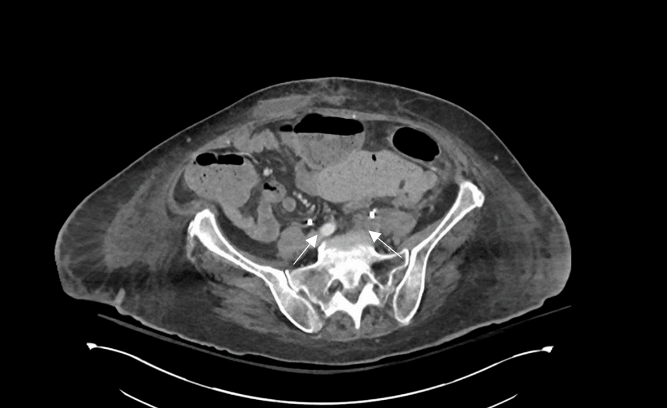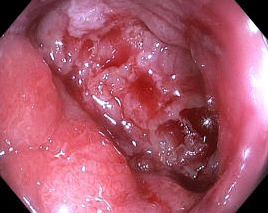Sunday Poster Session
Category: GI Bleeding
P0977 - Ischemic Colitis as a Complication of Femoral-Femoral Bypass Surgery
Sunday, October 26, 2025
3:30 PM - 7:00 PM PDT
Location: Exhibit Hall

Aditya Avula, DO
CHI Health Creighton University Medical Center
Omaha, NE
Presenting Author(s)
Aditya Avula, DO1, Amalia Jereczek, MD2, Ricky Rana, MD3, Clive Miranda, DO4, Wuttiporn Manatsathit, MD4
1CHI Health Creighton University Medical Center, Omaha, NE; 2University of Nebraska Medical Center, Omaha, NE; 3Creighton University School of Medicine, Omaha, NE; 4Creighton University Medical Center, Omaha, NE
Introduction: Ischemic colitis is the most common form of intestinal ischemia, that most often occurs secondary to a reduction of blood flow to the colon. This condition is caused by a variety of pathologies including atherosclerosis, vasculitis, hypoperfusion, and embolic events. We present a rare case of ischemic colitis as a complication of femoral-femoral bypass surgery.
Case Description/
Methods: A 69-year-old female with a history of ischemic cardiomyopathy, type II diabetes mellitus, and peripheral vascular disease with a prior left below the knee amputation presented with a three-day history of hematochezia. She had undergone a femoral-femoral bypass surgery three months prior and tolerated the procedure without complication. She was placed on apixaban and clopidogrel following the procedure. On admission, she was found to be in hypovolemic shock, requiring aggressive resuscitation. Her labs were significant for a hemoglobin of 7.6 g/dL and a fecal calprotectin of >3000 mcg/g. After initial stabilization, she underwent colonoscopy for further evaluation of her hematochezia. The procedure was aborted early due to bowel stenosis at the recto-sigmoid colon. There was near-complete circumferential stenosis with swollen and friable mucosa with poor vascularity. Biopsies were taken with cold forceps, which supported the diagnosis of ischemic colitis. The patient was monitored post-procedure, and ultimately her hematochezia resolved, and hemoglobin level stabilized over the next two days.
Discussion: Due to her clinical history, as well as the laboratory and endoscopic findings, this patient’s recto-sigmoid stenosis is suspected to be secondary to ischemic colitis related to her recent femoral-femoral bypass surgery. Following her colonoscopy, a CT abdomen with contrast was performed which showed moderate stenosis of the origin of the superior mesenteric artery, celiac artery, and complete occlusion of the left iliac artery. The femoral-femoral bypass graft was shown to be patent with reconstitution of the left common femoral artery. With these further imaging findings, it was determined that the ischemic damage to the recto-sigmoid colon was likely due to the occlusion of the left iliac artery, and the resulting compromise of vascular supply to the rectum via the rectal artery. This case illustrates a unique way surgical intervention involving large vessels can alter blood flow dynamics, resulting in compromise of colonic perfusion, leading to larger clinical consequences.

Figure: Near-complete obstructing, circumferential stenosis with swollen, friable mucosa seen in the recto-sigmoid colon

Figure: CT Abdomen with contrast demonstrating occlusion of the left iliac artery
Disclosures:
Aditya Avula indicated no relevant financial relationships.
Amalia Jereczek indicated no relevant financial relationships.
Ricky Rana indicated no relevant financial relationships.
Clive Miranda indicated no relevant financial relationships.
Wuttiporn Manatsathit indicated no relevant financial relationships.
Aditya Avula, DO1, Amalia Jereczek, MD2, Ricky Rana, MD3, Clive Miranda, DO4, Wuttiporn Manatsathit, MD4. P0977 - Ischemic Colitis as a Complication of Femoral-Femoral Bypass Surgery, ACG 2025 Annual Scientific Meeting Abstracts. Phoenix, AZ: American College of Gastroenterology.
1CHI Health Creighton University Medical Center, Omaha, NE; 2University of Nebraska Medical Center, Omaha, NE; 3Creighton University School of Medicine, Omaha, NE; 4Creighton University Medical Center, Omaha, NE
Introduction: Ischemic colitis is the most common form of intestinal ischemia, that most often occurs secondary to a reduction of blood flow to the colon. This condition is caused by a variety of pathologies including atherosclerosis, vasculitis, hypoperfusion, and embolic events. We present a rare case of ischemic colitis as a complication of femoral-femoral bypass surgery.
Case Description/
Methods: A 69-year-old female with a history of ischemic cardiomyopathy, type II diabetes mellitus, and peripheral vascular disease with a prior left below the knee amputation presented with a three-day history of hematochezia. She had undergone a femoral-femoral bypass surgery three months prior and tolerated the procedure without complication. She was placed on apixaban and clopidogrel following the procedure. On admission, she was found to be in hypovolemic shock, requiring aggressive resuscitation. Her labs were significant for a hemoglobin of 7.6 g/dL and a fecal calprotectin of >3000 mcg/g. After initial stabilization, she underwent colonoscopy for further evaluation of her hematochezia. The procedure was aborted early due to bowel stenosis at the recto-sigmoid colon. There was near-complete circumferential stenosis with swollen and friable mucosa with poor vascularity. Biopsies were taken with cold forceps, which supported the diagnosis of ischemic colitis. The patient was monitored post-procedure, and ultimately her hematochezia resolved, and hemoglobin level stabilized over the next two days.
Discussion: Due to her clinical history, as well as the laboratory and endoscopic findings, this patient’s recto-sigmoid stenosis is suspected to be secondary to ischemic colitis related to her recent femoral-femoral bypass surgery. Following her colonoscopy, a CT abdomen with contrast was performed which showed moderate stenosis of the origin of the superior mesenteric artery, celiac artery, and complete occlusion of the left iliac artery. The femoral-femoral bypass graft was shown to be patent with reconstitution of the left common femoral artery. With these further imaging findings, it was determined that the ischemic damage to the recto-sigmoid colon was likely due to the occlusion of the left iliac artery, and the resulting compromise of vascular supply to the rectum via the rectal artery. This case illustrates a unique way surgical intervention involving large vessels can alter blood flow dynamics, resulting in compromise of colonic perfusion, leading to larger clinical consequences.

Figure: Near-complete obstructing, circumferential stenosis with swollen, friable mucosa seen in the recto-sigmoid colon

Figure: CT Abdomen with contrast demonstrating occlusion of the left iliac artery
Disclosures:
Aditya Avula indicated no relevant financial relationships.
Amalia Jereczek indicated no relevant financial relationships.
Ricky Rana indicated no relevant financial relationships.
Clive Miranda indicated no relevant financial relationships.
Wuttiporn Manatsathit indicated no relevant financial relationships.
Aditya Avula, DO1, Amalia Jereczek, MD2, Ricky Rana, MD3, Clive Miranda, DO4, Wuttiporn Manatsathit, MD4. P0977 - Ischemic Colitis as a Complication of Femoral-Femoral Bypass Surgery, ACG 2025 Annual Scientific Meeting Abstracts. Phoenix, AZ: American College of Gastroenterology.
